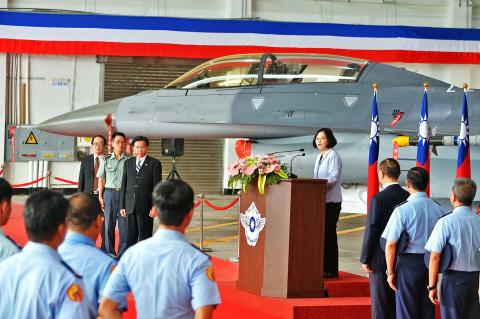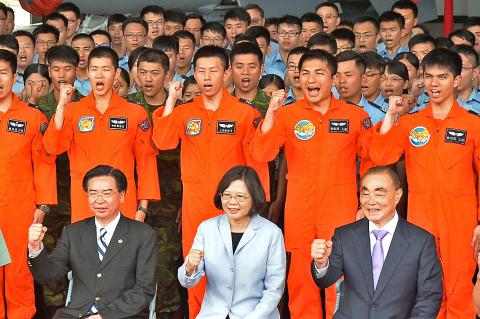President Tsai Ing-wen (蔡英文) yesterday made her first visit to a military base in her role as the head of state and commander-in-chief, pledging to restore public pride in the army and make a military career appealing.
Accompanied by Minister of National Defense Feng Shih-kuan (馮世寬), National Security Council Secretary-General Joseph Wu (吳釗燮) and Wu’s deputy, York Chen (陳文政), Tsai boarded a plane at Songshan Air Base in Taipei to fly to Hualien, where she visited the Hualien Air Force Base and the Chiashan Air Base.
The Hualien Air Force Base is home to the 401st Tactical Fighter Wing, which has F-16 jets and RF-5 reconnaissance aircraft.

Photo: CNA
Its primary tasks in times of peace include photographic reconnaissance missions, as well as disaster prevention and relief.
The Chiashan Air Base is used as a training ground for the Air Education Training and Doctrine Development Command and includes a facility dug into a nearby mountain that can reportedly accommodate 250 aircraft.
“Today is the first time I have come here to meet with the brothers and sisters of our nation’s armed forces in my capacity as president and commander-in-chief,” Tsai said in her address, delivered against the backdrop of two F-16s.

Photo: CNA
Tsai said her visit was not an obligation, but was to demonstrate her determination to stand alongside the military in pushing for reform and defending the nation.
The bases are significant to national defense for two major reasons, Tsai said, including their roles as the most vital grounds for training exercises in eastern Taiwan and for preserving combat capabilities.
“You have all fulfilled your duties. Now, I am going to tell you what I can do for you,” Tsai said.
The president listed three goals: elevating the dignity of and restoring public pride in military personnel; transforming military service into an alluring career for young people by improving soldiers’ quality of life and the military’s management style; and assisting personnel to cultivate their second professional specialty to enhance their competitiveness in the job market if they leave the armed forces.
“I am here to tell you that the new government will steer our armed forces into a new era with our unequivocal strategic guidelines, meticulous policy planning, steady steps toward reforms, thorough communication with the public, and abundant resources and support,” Tsai said.
“As the Air Force of the Republic of China, we must not let others flaunt their prowess in our territorial air space,” Tsai said, vowing to safeguard the dignity, honor and welfare of soldiers.
Tsai joined 244 military personnel for lunch in a dinning hall at the Chiashan Air Base, where she gave another speech calling on the armed forces to defend Taiwanese lives and property, as well as the nation’s freedom and democracy.
Tsai also encouraged the military to make unreserved efforts in their disaster prevention and relief missions and to be the “rock of the people,” as the nation enters flood season after Dragon Boat Festival on June 9.

Right-wing political scientist Laura Fernandez on Sunday won Costa Rica’s presidential election by a landslide, after promising to crack down on rising violence linked to the cocaine trade. Fernandez’s nearest rival, economist Alvaro Ramos, conceded defeat as results showed the ruling party far exceeding the threshold of 40 percent needed to avoid a runoff. With 94 percent of polling stations counted, the political heir of outgoing Costa Rican President Rodrigo Chaves had captured 48.3 percent of the vote compared with Ramos’ 33.4 percent, the Supreme Electoral Tribunal said. As soon as the first results were announced, members of Fernandez’s Sovereign People’s Party

EMERGING FIELDS: The Chinese president said that the two countries would explore cooperation in green technology, the digital economy and artificial intelligence Chinese President Xi Jinping (習近平) yesterday called for an “equal and orderly multipolar world” in the face of “unilateral bullying,” in an apparent jab at the US. Xi was speaking during talks in Beijing with Uruguayan President Yamandu Orsi, the first South American leader to visit China since US special forces captured then-Venezuelan president Nicolas Maduro last month — an operation that Beijing condemned as a violation of sovereignty. Orsi follows a slew of leaders to have visited China seeking to boost ties with the world’s second-largest economy to hedge against US President Donald Trump’s increasingly unpredictable administration. “The international situation is fraught

MORE RESPONSIBILITY: Draftees would be expected to fight alongside professional soldiers, likely requiring the transformation of some training brigades into combat units The armed forces are to start incorporating new conscripts into combined arms brigades this year to enhance combat readiness, the Executive Yuan’s latest policy report said. The new policy would affect Taiwanese men entering the military for their compulsory service, which was extended to one year under reforms by then-president Tsai Ing-wen (蔡英文) in 2022. The conscripts would be trained to operate machine guns, uncrewed aerial vehicles, anti-tank guided missile launchers and Stinger air defense systems, the report said, adding that the basic training would be lengthened to eight weeks. After basic training, conscripts would be sorted into infantry battalions that would take

GROWING AMBITIONS: The scale and tempo of the operations show that the Strait has become the core theater for China to expand its security interests, the report said Chinese military aircraft incursions around Taiwan have surged nearly 15-fold over the past five years, according to a report released yesterday by the Democratic Progressive Party’s (DPP) Department of China Affairs. Sorties in the Taiwan Strait were previously irregular, totaling 380 in 2020, but have since evolved into routine operations, the report showed. “This demonstrates that the Taiwan Strait has become both the starting point and testing ground for Beijing’s expansionist ambitions,” it said. Driven by military expansionism, China is systematically pursuing actions aimed at altering the regional “status quo,” the department said, adding that Taiwan represents the most critical link in China’s